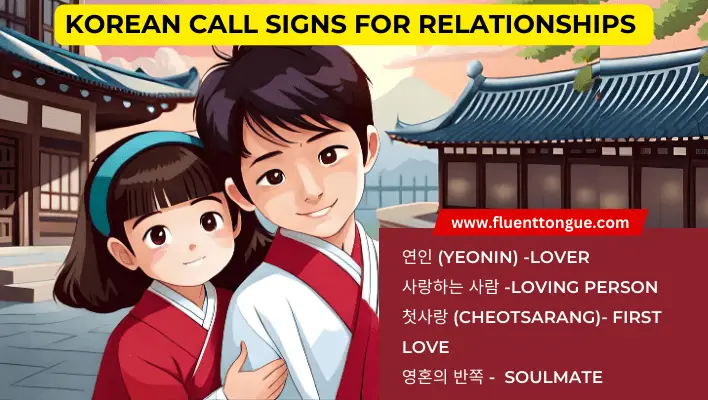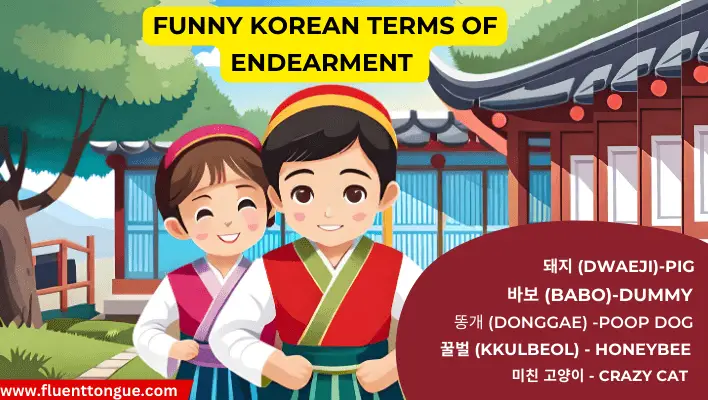Ever struggled to find the perfect words to express your affection for your loved ones? Look no further!
In this comprehensive guide, we will explore the world of Korean terms of endearment, cute Korean words, and phrases that will make your loved ones feel truly special.
From cute Korean words for your significant other to funny Korean terms of endearment for friends, family, and more, we’ve got you covered.
So, let’s dive in
Table of Contents
Cute Korean Terms of Endearment (with Examples)

If you want to show your love in the sweetest way possible, these cute Korean words of endearment are perfect for you.
Here are five examples to get you started:
자기야 (Jagiya) – This word translates to “honey” or “baby” and is commonly used between couples.
For example:
자기야, 사랑해 (Jagiya, saranghae) –
I love you, honey.
애인 (Aein) – Meaning “sweetheart,” this term is gender-neutral and can be used to refer to someone’s partner.
For example:
애인과 함께 여행했어요 (Aeinguwa hamkke yeohaenghaesseoyo) –
I traveled with my sweetheart.
여보 (Yeobo) – Translating to “darling” or “honey,” this term is used exclusively between married couples.
For example:
여보, 생일 축하해 (Yeobo, saengil chukhahae) –
Happy birthday, darling.
나의 사랑 (Naui Sarang) – This phrase means “my love” and can be used for both males and females.
For example:
나의 사랑을 찾고 있어요 (Naui sarangeul chatgo isseoyo) –
I am looking for my love.
애기야 (Aegiya) – A sweet way of saying “baby” in Korean.
For example:
애기야, 잘 자 (Aegiya, jal ja) –
Good night, baby.
Korean Terms of Endearment for Boyfriend

If you’re looking for special ways to call your Korean boyfriend, here are five examples of endearing terms to use:
오빠 (Oppa) – Literally meaning “older brother” for a younger female, this term is also commonly used by girls to address their older boyfriends.
For example:
오빠, 보고 싶어요 (Oppa, bogo sipeoyo)
I miss you, Oppa.
남친 (Namchin) – This term is a shortened version of “남자 친구 (namja chingu)” and means “boyfriend.”
For example:
남친이랑 영화를 봤어요 (Namchinirang yeonghwareul bwasseoyo)
I watched a movie with my boyfriend.
왕자님 (Wangjanim) – Meaning “prince” or “prince charming,” this term can be used by girls to address their boyfriends in a loving and playful way.
For example:
당신은 나의 왕자님이에요 (Dangsineun naui wangjanimieyo)
You are my prince.
내 사랑 (Nae Sarang) – As mentioned earlier, this phrase means “my love” and can also be used to address your boyfriend.
For example:
내 사랑과 함께 여행하고 싶어요 (Nae saranggwa hamkke yeohaenghago sipeoyo) –
I want to travel with my love.”
자기야 (Jagiya) – “Honey” or “baby” can also be used to address your boyfriend in a sweet and loving way.
For example:
자기야, 용서해줘 (Jagiya, yongseohaejwo)
“Forgive me, darling.”
Korean Terms of Endearment for Girlfriend

If you’re looking for special ways to call your Korean girlfriend, here are five examples of endearing terms to use:
여친 (Yeochin) – This term is a shortened version of “여자 친구 (yeoja chingu)” and means “girlfriend.”
For example:
여친과 함께 요리를 만들었어요 (Yeochingwa hamkke yorireul mandeureosseoyo) –
I cooked with my girlfriend.
공주님 (Gongjunim) – Meaning “princess,” this term can be used by boys to address their girlfriends in a loving and playful way.
For example:
공주님, 오늘 정말 예뻐요 (Gongjunim, oneul jeongmal yeppeoyo) –
You look really beautiful today, princess.
내꺼 (Naekkeo) – Translating to “mine” or “my sweetheart,” this term adds an extra layer of cuteness to your relationship.
For example:
내꺼야, 너무 사랑해 (Naekkeoya, neomu saranghae) –
My sweetheart, I love you so much.
자기야 (Jagiya) – As mentioned earlier, this word means “honey” or “baby” and can also be used to address your girlfriend in a sweet and loving way.
For example:
자기야, 같이 쇼핑하자 (Jagiya, gachi syopinghaja)
Let’s go shopping together, baby.
애인 (Aein) – “Sweetheart” can also be used to address your girlfriend in a loving and affectionate manner.
For example:
애인과 함께 여행을 계획하고 있어요 (Aeingwa hamkke yeohaengeul gyehoekhago isseoyo)
I am planning a trip with my sweetheart.
Korean Terms of Endearment for Couples

Looking for endearing terms that both you and your significant other can use together?
Here are five examples to strengthen your bond:
자기야 (Jagiya) – As mentioned earlier, this word means “honey” or “baby” and can be used by both partners in the relationship.
For example:
자기야, 우리 결혼 기념일 축하해 (Jagiya, uri gyeolhon ginyeomil chukahae)
“Happy anniversary, honey.”
내 사랑 (Nae Sarang) – “My love” is a beautiful term that can be used by both partners to express their affection for one another.
For example:
내 사랑, 오늘 하루 어땠어요? (Nae sarang, oneul haru eottaesseoyo?)
“How was your day, my love?”
애인 (Aein) – “Sweetheart” is another term that can be used by both partners in a loving and affectionate manner.
For example:
애인과 함께 데이트하러 가요 (Aeingwa hamkke deiteuhareo gayo)
“Going on a date with my sweetheart.”
영원한 사랑 (Yeongwonhan Sarang) – This phrase translates to “eternal love” and can be used by couples to express their commitment to one another.
For example:
영원한 사랑을 약속해요 (Yeongwonhan sarangeul yaksokhaeyo)
“I promise eternal love.”
소중한 사람 (Sojunghan Saram) – Meaning “precious person,” this term is perfect for couples who cherish each other deeply.
For example:
소중한 사람과 함께 평생을 보내고 싶어요 (Sojunghan saramgwa hamkke pyeongsaengeul bonaego sipeoyo) –
I want to spend my life with my precious person.
Korean Call Signs for Relationships

Want to address your significant other in a unique and special way? Here are five Korean call signs for relationships that you can use:
연인 (Yeonin) – This term means “lover” and can be used to refer to both boyfriends and girlfriends in a relationship.
For example:
우리는 연인 사이야 (Urineun yeonin saiya)
We are lovers.
사랑하는 사람 (Saranghaneun Saram) – Translating to “loving person,” this term can be used to address your significant other in a sweet and affectionate way.
For example:
사랑하는 사람과 함께 있고 싶어요 (Saranghaneun saramgwa hamkke itgo sipeoyo)
I want to be with my loving person.
첫사랑 (Cheotsarang) – Meaning “first love,” this term can be used to reminisce about the beginning of your relationship.
For example:
너는 나의 첫사랑이야 (Neoneun naui cheotsarangiya)
You are my first love.
영혼의 반쪽 (Yeonghoneui Banjjok) – Translating to “soulmate,” this term can be used to express the deep connection between you and your partner.
For example:
너는 나의 영혼의 반쪽이야 (Neoneun naui yeonghoneui banjjogiya)
You are my soulmate.
인생의 사랑 (Insaengui Sarang) – Meaning “love of my life,” this term is perfect for expressing your deep love and appreciation for your significant other.
For example:
너는 나의 인생의 사랑이야 (Neoneun naui insaengui sarangiya)
You are the love of my life.
Funny Korean Terms of Endearment

Looking for some funny Korean terms of endearment to lighten up your relationship?
Here are five examples to make your loved ones laugh:
똥개 (Donggae) – This term literally means “poop dog” and can be used humorously between friends or couples.
For example:
똥개야, 오늘 뭐해? (Donggaeya, oneul mwohae?)
Hey poop dog, what are you doing today?
꿀벌 (Kkulbeol) – Meaning “honeybee,” this term can be used humorously between couples to refer to one another.
For example:
꿀벌아, 어디 가고 싶어? (Kkulbeola, eodi gago sipeo?)
Hey honeybee, where do you want to go?
바보 (Babo) – Translating to “dummy” or “idiot,” this term can be used playfully between friends or couples.
For example:
바보야, 그건 아니야 (Baboya, geugeon aniya)
Dummy, that’s not right.
미친 고양이 (Michin Goyangi) – Meaning “crazy cat,” this term can be used humorously between friends or couples to refer to one another.
For example:
미친 고양이야, 정신 차려! (Michin goyangiya, jeongsin charyeo!)
Crazy cat, snap out of it!
돼지 (Dwaeji) – Literally meaning “pig,” this term can be used humorously between friends or couples to tease one another in a playful manner.
For example:
돼지야, 또 먹고 싶어? (Dwaejiya, tto meokgo sipeo?)
Hey pig, want to eat again?
Korean Terms of Endearment for Children

Looking for sweet and loving terms to address your children or younger family members? Here are five examples of endearing Korean terms for children:
애기 (Aegi) – Meaning “baby,” this term can be used to address young children in a loving way.
For example:
애기야, 잘 자 (Aegiya, jal ja)
Good night, baby.
꼬마 (Kkoma) – Translating to “little one” or “kid,” this term is perfect for addressing young children.
For example:
꼬마야, 너무 귀여워 (Kkomaya, neomu gwiyeowo)
Little one, you’re so cute.
아기 천사 (Agi Cheonsa) – Meaning “baby angel,” this term can be used to show your affection for your children.
For example:
아기 천사야, 언제나 사랑해 (Agi cheonsaya, eonjena saranghae)
Baby angel, I love you always.
내 작은 별 (Nae Jageun Byeol) – Translating to “my little star,” this term is a sweet way to address your child.
For example:
내 작은 별아, 너무 빛나 (Nae jageun byeola, neomu bitna)
My little star, you shine so brightly.
소중한 보물 (Sojunghan Bomore) – Meaning “precious treasure,” this term can be used to express your love for your child.
For example:
소중한 보물아, 언제나 행복해 (Sojunghan bomorea, eonjena haengbokhae)
My precious treasure, always be happy.
Cute Korean Nicknames for Girls

Looking for cute Korean nicknames for girls? Here are five examples:
꽃 (Kkot) – Meaning “flower,” this nickname can be used to express the beauty of a girl.
For example:
꽃처럼 예쁜 소녀야 (Kkotcheoreom yeppeun sonyeoya)
A girl as pretty as a flower.
나비 (Nabi) – Translating to “butterfly,” this nickname can be used to describe a girl’s grace and elegance.
For example:
나비 같은 소녀야 (Nabi gateun sonyeoya)
A girl like a butterfly.
달빛 (Dalbit) – Meaning “moonlight,” this nickname can be used to describe a girl’s mysterious and enchanting beauty.
For example:
달빛처럼 아름다운 소녀야 (Dalbitcheoreom areumdaun sonyeoya)
A girl as beautiful as moonlight.
천사 (Cheonsa) – Translating to “angel,” this nickname can be used to describe a girl’s pure and innocent nature.
For example:
천사 같은 순수한 소녀야 (Cheonsa gateun sunsuhan sonyeoya)
A pure and innocent girl like an angel.
보석 (Boseok) – Meaning “jewel” or “gem,” this nickname can be used to express the preciousness of a girl.
For example:
보석처럼 소중한 소녀야 (Boseokcheoreom sojunghan sonyeoya) –
A precious girl like a jewel.
Korean Nicknames for Friends, Family, and More

Looking for Korean nicknames for friends, family, and more? Here are five examples:
친구 (Chingu) – Meaning “friend,” this nickname can be used to address your close friends.
For example:
친구야, 오랜만이야 (Chinguya, oraenmaniya)
Hey friend, long time no see.
막내 (Maknae) – Translating to “youngest,” this nickname can be used to address the youngest member of a group or family.
For example:
막내야, 어때? (Maknaeya, eottae?)
Hey youngest, how are you?
동생 (Dongsaeng) – Meaning “younger sibling,” this term can be used to address a younger brother or sister.
For example:
동생아, 공부 잘해 (Dongsaenga, gongbu jalhae)
Younger sibling, study well.
누나/언니 (Nuna/Unni) – These terms mean “older sister” and can be used to address an older sister or female friend.
For example:
누나야, 도와줘 (Nunaya, dowajwo)
Older sister, help me.
형/오빠 (Hyeong/Oppa) – Meaning “older brother,” these terms can be used to address an older brother or male friend.
For example:
형아, 같이 놀자 (Hyeonga, gachi nolja)
Older brother, let’s play together.
Korean Endearment Words and Phrases You Will Often Hear in K-Dramas
If you’re a fan of K-dramas, you’ve probably noticed that Korean terms of endearment are often used by the characters. Here are some popular phrases you might hear:
- 사랑해요 (Saranghaeyo) – Meaning “I love you,” this phrase is commonly used in romantic K-dramas.
- 당신과 함께 있고 싶어요 (Dangsingwa hamkke itgo sipeoyo) – Translating to “I want to be with you,” this phrase is often used by couples expressing their desire to be together.
- 오늘도 좋은 하루 되세요 (Oneuldo joheun haru doeseyo) – Meaning “Have a good day today,” this phrase is often used by characters wishing each other well.
- 보고 싶어요 (Bogo sipeoyo) – Translating to “I miss you,” this phrase is commonly used by characters who are separated from their loved ones.
- 행복하세요 (Haengbokhaseyo) – Meaning “Be happy,” this phrase is often used by characters wishing happiness for one another.
Things to Remember When Using These Korean Terms of Endearment
When using these Korean terms of endearment, it’s essential to keep in mind the context and the relationship between you and the person you’re addressing.
Some terms may only be appropriate for close friends, family members, or romantic partners, while others can be used more broadly.
You can start practicing saying these words using the links I found on the web
https://quizlet.com/161280613/terms-of-endearmentromancekdrama-stuff-flash-cards/
https://quizlet.com/376067490/intimate-korean-flash-cards/
Additionally, it’s important to remember that the Korean language has different levels of politeness and formality.
Make sure to use the appropriate level of politeness when addressing someone, especially if they are older or in a higher social position.
Finally, always be mindful of the cultural differences and the unique nuances of the Korean language.
When in doubt, ask a native speaker or a language teacher for guidance.
Conclusion
With these Korean terms of endearment in your vocabulary, you’re now ready to express your love and affection for your loved ones in a unique and memorable way.
So, get ready to impress your friends, family, and significant other with your newfound Korean language skills.
Happy loving!
